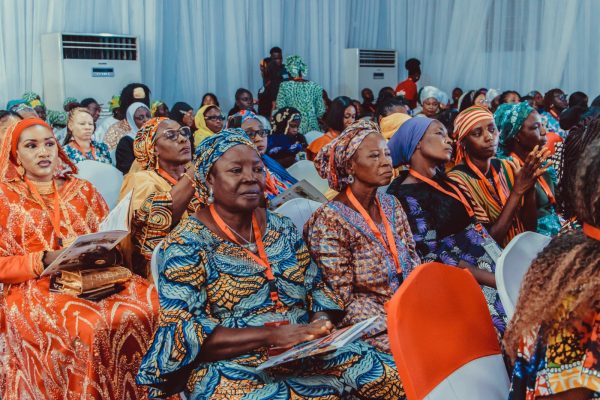Today, less than five per cent of women occupy elective political offices in Nigeria and following the outcome of the 2024 Voice of Women (VOW) annual conference which emphasised the role of grassroots women in driving increased participation of women in politics in Nigeria, hence the call for structural change to increase visibility of women.
Stakeholders have stressed the need to dismantle systemic barriers that limit women’s participation and ensure that grassroots female voters who form the backbone of Nigeria’s electoral strength begin to support and elect women into leadership positions.
At a meeting organised by Women Radio WFM 91.7 with the theme, ‘Using Grassroots Influence to Power Females in Governance’, had in attendance women leaders, policymakers and civil society members examine strategies to improve female representation ahead of the 2027 general election.
A key highlight of the meeting was the launch of a grassroots women voting survey report by Women Radio and Voice of Women Empowerment Foundation, with support from the MacArthur Foundation. The report, based on responses from 3,734 women across Nigeria’s 36 states and the FCT, revealed critical insights into why grassroots women continue to vote overwhelmingly for male candidates, despite being politically active and holding Permanent Voter Cards in large numbers.
The data revealed that 82 percent of respondents cited lack of women not presented as candidates by political parties as major reason for voting men over women; 76 percent of respondents said they were influenced by party leaders, their husbands, spiritual leaders and a culture that women cannot lead; 68 percent cited a lack of empathy for women in power who are arrogant and inaccessible while 42 percent cited inexperience as reason for not voting women.
The report also revealed grassroot women voting pattern in Northern and Southern regions. While Northern Grassroot Women voting pattern influenced by 89 per cent absence of female candidates; 28 percent preferred choice of spouse, traditional, religious and political leaders and 11 percent constituency mismatch, Southern Grassroot Women voting pattern was influenced by 85 percent absence of female candidates; 62 percent influence of political parties and leaders; 38 percent political inexperience and only 12 percent merit-based perspective.
Programmes Manager, Women Radio, Adebola Adeduba, said there is need to take critical steps in closing the gap between grassroots women and female political aspirants. She said the mission is to identify and address the disconnect that keeps Nigeria’s largest and most loyal voting bloc – the grassroots women, from overwhelmingly electing male candidates into office.
“We know the problem. Now we must move to solutions. Why do our most consistent voters, the grassroots women still overwhelmingly vote for male candidates? What can we do differently as we prepare for the 2026–2027 election cycle?”
Minister of Women Affairs, Imaan Sulaiman-Ibrahim in her opening remarks, emphasised that meaningful inclusion of women in politics is not a favour but a democratic necessity.
She highlighted the reintroduction of a special bill seeking 182 additional legislative seats for women at national and state levels. The bill proposes 74 seats in the National Assembly, one senator and one House of Representatives member from each state and the FCT, as well as 108 across state Houses of Assembly.
“The bill is not asking for handouts, it is a constitutional correction. It’s about justice, equity, and the future of Nigeria. Nigerian women constitute less than five percent of elected officials. This imbalance stifles our collective progress,” Sulaiman-Ibrahim said.
Deputy British High Commissioner to Nigeria, Gill Lever, aligned with the Minister’s call for deeper inclusion and urged participants to reflect on internalised societal standards that make women hesitant to vote for other women.
She questioned; “Why do we judge women more harshly in politics? Who are we listening to when we decide who to vote for? We must make decisions based on policies and leadership qualities, not outdated stereotypes about what women should or shouldn’t be.”
Also speaking, President, Women in Politics Forum, Ebere Ifendu, commended Women Radio for the research, describing the findings as a vital advocacy tool. She pointed out that 95 per cent of women surveyed have their PVCs, yet only 31 per cent voted for female candidates in the last general election.
“This number is a wake-up call. The grassroots women hold the numbers that can swing elections. But if they don’t understand our issues, they won’t vote for us. We must take our message to them. We must be visible, accountable, and relatable.”
President, Nigeria League of Women Voters, Irene Awunah-Ikyegh, also urged women across the country to seize the opportunity presented by the special seats bill and engage legislators at every level. “If we do nothing, we will return to the ballot in 2027 and once again find only male candidates to choose from.”
She called for solidarity among women, stressing that political ambition should be matched with support, visibility, and sustained grassroots engagement. “When a woman is running, we must rally behind her, not just during elections but through her journey in office. Let’s be her support system,” she said.
A member of the Kwara State House of Assembly, Rukayatu Shittu emphasised humility as a virtue for political success urging any woman that wishes to go into politics to identify with the grassroots with continuous engagement and to be accessible, even as a 2019 aspirant and founder, Advocacy for Women with Disabilities Initiative, Bilikisu Yakubu, urged female aspirants not to wait for election time before engaging grassroots women.



